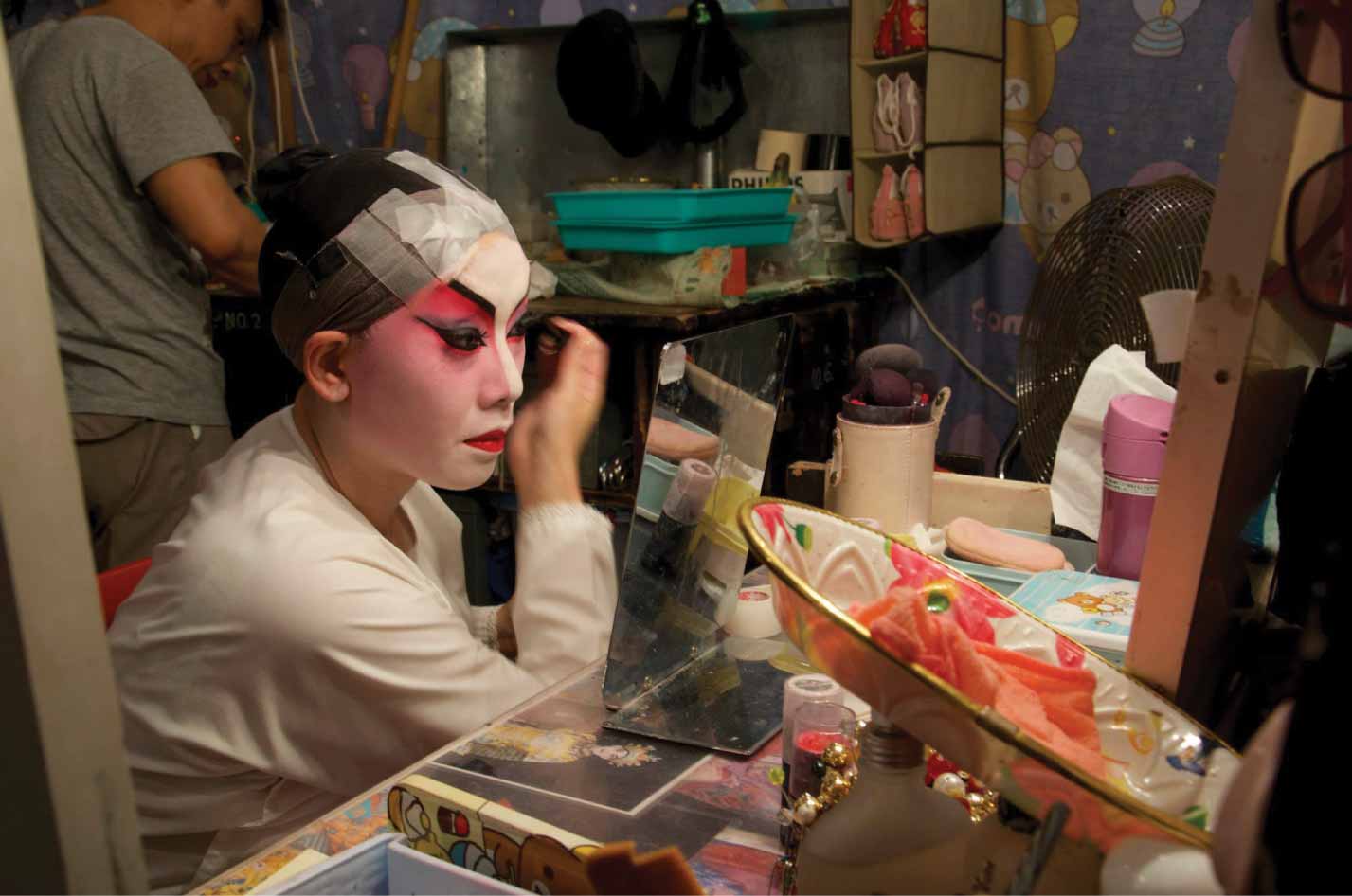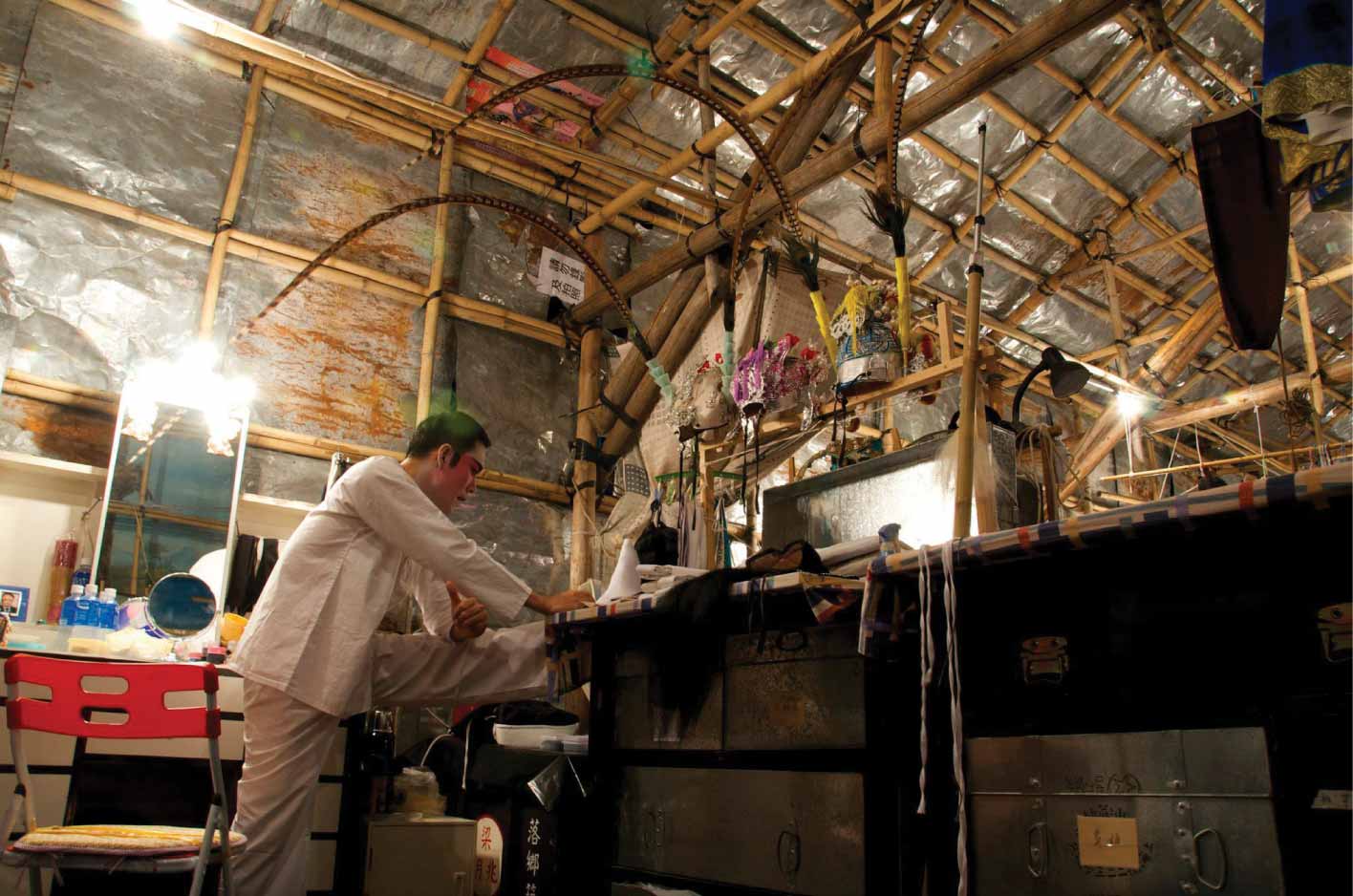NEWS & EVENTS > INTERVIEW
"A nation's culture resides in the hearts and in the soul of its people"
-Mahatma Ghandi
Ms. Wang Kit Ching- Cantonese Opera Actress
December 2015

Ms. Chan Wing Yee, putting on make-up, Tin Hau Festival, Lamma Island. Photo by Joanne Ng, 2015.
What is your preparation process for a role? Have you ever encountered any difficulties in preparing for and portraying a role?
I will first read the script from beginning to end, to try to see what the approach and starting point for my role should be. Preparation time and method is different with each script, and each script usually has some sort of historical basis and literary foundation to research. For example just this year, I really enjoyed performing in Dream of the Red Chamber (紅樓夢), where I was the fadan (the main female character, the “flower” or young belle), Lin Daiyu. This role required more research than any role I’ve had in recent years. Beyond reading the novel, I also watched the 50 plus episodes of the mainland China TV series adaptation. But later I discovered that the character of Lin Daiyu as portrayed in theTV series and as written in the opera script aren’t similar at all, but studying the different portrayals allowed me to carefully consider what the defining characteristics of Lin Daiyu should be.
In addition, I will turn to my seniors in the trade to ask for their guidance, like advice on how to portray the character’s state of mind, and areas of improvement. I will also discuss things with the actors and actresses playing the other roles, such as the young scholar, the young belle, the male clown (醜生), and the male military character (武生).
I was part of a production called Love Triangle that was shown at Yau Ma Tei Theater. This is a very old script—one so old that even many of the seniors in the industry have not seen it. My role was a complex one that spanned two generations, portraying a character that starts off as a young girl without guile, who then enters the imperial court and becomes the empress. In the process, she finds herself in a situation where she goes against her own nature and kills someone. There weren’t any resources to turn to when preparing for the role—no information I could research, and no seniors that had done the play before, so I had to rely on my own incessant analysis of the role, and my own experience. That was a very challenging script, but also very rewarding.
What have you gained from Cantonese opera? What has it taught you?
Cantonese opera has given me a foundation of confidence. When a Cantonese opera actor can handle the thousand pairs of eyes that are on them on stage, then they can more easily exhibit the fruits of their rehearsals and practice.

Mr. Liang Zhao Ming, performing stretches before
the show, Tin Hau Festival, Lamma Island.
Photo by Joanne Ng, 2015.
I also think that Cantonese opera has made me more firm and persistent. I am the youngest in the family by quite a few years, and I can say that I was spoiled by my family and quite dependent on them. Opera has helped me to develop independence and the ability to handle different situations. I can confirm that being a Cantonese opera is challenging! For example, when performing in shows that take place outdoors during traditional festivals in hot weather, it can be quite easy for the performers to get heatstroke. When the audience, who despite getting to fan themselves and drink cold soda, are still feeling hot, the performers are having to deal with several layers of clothing, and the fadan also has this big head crown to wear, that keeps the heat trapped around the head for the whole night. Add to that the heat of the powerful stage lights, and the chances of heatstroke are quite high.
Three, four years ago before I had yet to find a good Chinese doctor, my skin was very sensitive (for Cantonese opera you have to put on thick make up), so I went to a western doctor instead, who prescribed me steroids and antibiotics, and after consuming them for a year, it affected my health negatively. But even if I’m feeling unwell, I still have to perform, so I am already used to this. Last year, when I was fadan in Di Nu Fa, I had a fever on the second night, and by the time it was the intermission, I had lost half of my voice—I could still sing the high notes but could no longer speak at a lower register. It was like that the whole week of performances. There are no sick days with Cantonese opera. You may be sick, but the moment you step on stage you are to show no signs of illness.
Another thing I have gained from Cantonese opera is the ability to manage emotions. It is impossible for people to always be happy 365 days of the year. I remember one year where I had to perform 14 days in a row, and it just so happened that the first day of the performances was also my grandmother’s burial. My grandmother lived with us when growing up, and as my parents had to work, she practically raised me, so it was a big emotional hit for me when she passed away. I’m actually very grateful, because the leader of the troupe knew that I had the night vigil, and told me that I didn’t need to act in the play that night, and also helped me to find a replacement for my role for the next day, so that I could be there for the burial—because it was a small-scale production, it was easier to find a Cantonese opera student to act as stand-in. When others heavy of heart had the opportunity to go home and rest after the burial, that was when I had to commence my 14 day-run of the production.
I will first read the script from beginning to end, to try to see what the approach and starting point for my role should be. Preparation time and method is different with each script, and each script usually has some sort of historical basis and literary foundation to research. For example just this year, I really enjoyed performing in Dream of the Red Chamber (紅樓夢), where I was the fadan (the main female character, the “flower” or young belle), Lin Daiyu. This role required more research than any role I’ve had in recent years. Beyond reading the novel, I also watched the 50 plus episodes of the mainland China TV series adaptation. But later I discovered that the character of Lin Daiyu as portrayed in theTV series and as written in the opera script aren’t similar at all, but studying the different portrayals allowed me to carefully consider what the defining characteristics of Lin Daiyu should be.
In addition, I will turn to my seniors in the trade to ask for their guidance, like advice on how to portray the character’s state of mind, and areas of improvement. I will also discuss things with the actors and actresses playing the other roles, such as the young scholar, the young belle, the male clown (醜生), and the male military character (武生).
I was part of a production called Love Triangle that was shown at Yau Ma Tei Theater. This is a very old script—one so old that even many of the seniors in the industry have not seen it. My role was a complex one that spanned two generations, portraying a character that starts off as a young girl without guile, who then enters the imperial court and becomes the empress. In the process, she finds herself in a situation where she goes against her own nature and kills someone. There weren’t any resources to turn to when preparing for the role—no information I could research, and no seniors that had done the play before, so I had to rely on my own incessant analysis of the role, and my own experience. That was a very challenging script, but also very rewarding.
What have you gained from Cantonese opera? What has it taught you?
Cantonese opera has given me a foundation of confidence. When a Cantonese opera actor can handle the thousand pairs of eyes that are on them on stage, then they can more easily exhibit the fruits of their rehearsals and practice.

Mr. Liang Zhao Ming, performing stretches before
the show, Tin Hau Festival, Lamma Island.
Photo by Joanne Ng, 2015.
Three, four years ago before I had yet to find a good Chinese doctor, my skin was very sensitive (for Cantonese opera you have to put on thick make up), so I went to a western doctor instead, who prescribed me steroids and antibiotics, and after consuming them for a year, it affected my health negatively. But even if I’m feeling unwell, I still have to perform, so I am already used to this. Last year, when I was fadan in Di Nu Fa, I had a fever on the second night, and by the time it was the intermission, I had lost half of my voice—I could still sing the high notes but could no longer speak at a lower register. It was like that the whole week of performances. There are no sick days with Cantonese opera. You may be sick, but the moment you step on stage you are to show no signs of illness.
Another thing I have gained from Cantonese opera is the ability to manage emotions. It is impossible for people to always be happy 365 days of the year. I remember one year where I had to perform 14 days in a row, and it just so happened that the first day of the performances was also my grandmother’s burial. My grandmother lived with us when growing up, and as my parents had to work, she practically raised me, so it was a big emotional hit for me when she passed away. I’m actually very grateful, because the leader of the troupe knew that I had the night vigil, and told me that I didn’t need to act in the play that night, and also helped me to find a replacement for my role for the next day, so that I could be there for the burial—because it was a small-scale production, it was easier to find a Cantonese opera student to act as stand-in. When others heavy of heart had the opportunity to go home and rest after the burial, that was when I had to commence my 14 day-run of the production.
Related links:
